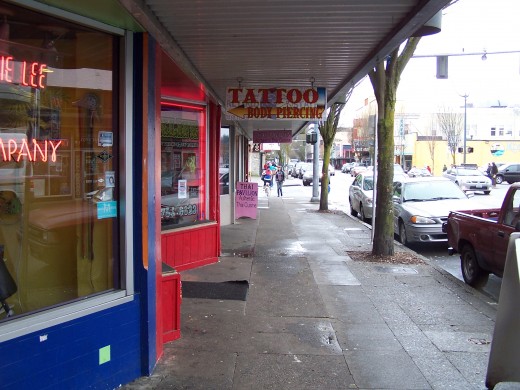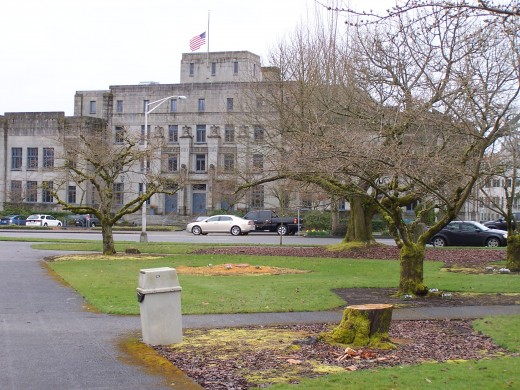- HubPages»
- Books, Literature, and Writing»
- Commercial & Creative Writing»
- Creative Writing
The Sun Never Rises: Chapter Ten
Rocky Mountain High
Thanks for returning as our homeless couple, Katie and Max, are dropped off in Denver, Colorado, slowly, painfully, persistently making their way west. Our story picks up on a snowy afternoon in the Mile High city, and it does not pick up on a positive note.
Shall we?

Three Hours
Three hours!
That’s the amount of time it took for us to get arrested for vagrancy in Denver.
Sister Agnes dropped us off, midday, at Commons Park along the banks of the South Platte River, the river just a trickle that day, the trees stripped of their leaves, random snowflakes escaping the suffocating clouds, the air brittle and tasting of grit. A city marching to the tune of commerce all around us, clogging the air with the din of progress, it made us immediately long for the open road we had just left. The kind nun wished us well, told us to march with God, and then pulled away, quickly engulfed by hundreds of taillights.
Three hours! Forty minutes enjoying coffee at a McDonalds, and two hours and change walking the streets, looking for a sign, any sign, that would call to us in our language.
“There’s not much here for us, is there, Max?” Katie said to me as she and I sat down on the sidewalk on Sixteenth, ambulances provided background music.
“Just a signpost, Katie, a way of marking off progress, getting our bearings, and choosing the next destination. From the looks of it, we’ve got two choices. We can follow the Seventy west, southwest, into Utah, or we can take the Twenty-Five north into Wyoming and then northwest from there. I’m thinking Wyoming. I just don’t think we’ll be too welcome in Mormon Country, but then I could be completely mistaken. What do you think?”
Before she could answer we heard the familiar whoop of the cop siren as a black-and-white pulled to the curb just ahead of us. A tall drink of water in a department-issued winter parka unfurled himself from the driver’s seat, said “good afternoon, folks,” and followed that up with “assume the position while I pat you two down, please,” and the please had no warmth in it at all.

City Ordinances
Slightly taller than me, bulky, our new law enforcement friend probably played football locally, washed out with an injury, and turned to law enforcement. He looked to be five or six years north of college age, a pleasant enough face, not yet chiseled down by the life of a cop, and he had one of those bodies that would turn to seed and balloon to two-eighty in about ten years. I’d seen enough of them in the army, country boys with no sense of good nutrition, and completely lost after the last pass and tackle of their football lives.
“We’ve got a city ordinance in Denver, folks,” he told us after checking our I.D.s “There’s no sitting on sidewalks from seven a.m. to five p.m.”
“So, Officer,” I said. “You’re telling me if the mayor of your fine city decided to take a break and sit down on a sidewalk, he’d be frisked by you as well, or is this ordinance pretty specific about certain types of people?” I could feel Katie’s hand gripping my arm tightly.
“What I’m telling you,” he said as he opened the backdoor of his cruiser, “Is you and your lady friend are about to become guests of the City of Denver for the weekend. I can cuff you or you can behave yourselves, but either way I want you in the backseat now!”

Sixty Hours
Not all jails are the same. You learn that truth pretty quickly on the streets. Denver’s was better than average. Katie and I were processed into the system and then separated. I was placed in a large holding pen with twelve other vagrants, drunks and addicts. Kate, I assumed, was experiencing a similar fate in the women’s detainment area.
The jail was clean, no roaches, no rats, well-maintained, the city personnel business-like but not cruel, and that, really, makes all the difference. They had a job to do. They didn’t write the laws but they did enforce them, and they did it all with an efficient detachment. I was a number, one of thousands to grace those cells during any given year, and my number would be forgotten just as soon as I processed out on Monday.
It was an uneventful sixty hours. I’m big enough so I’ll be left alone in situations like that, and my veteran status gave me a few creds among the guards. I spent the time thinking about Katie and hoping she was treated respectfully.
Which she was, or so she told me ten minutes after we were released Monday morning at eight sharp.
We hugged on the sidewalk after being reunited. I kissed her as snow flurries turned her flaming red hair to white. She told me she was all right, she’d been treated well, and then the tears fell.
The Truth of It All
“Shit, Max, I don’t know why I’m crying. It’s not the first time I’ve had my ass tossed in jail, three times back east, actually, twice for hookin’ and once for shoplifting, in and out of the system, you know, it was expected and I did the time. But this was different. This interrupted some damned fairytale I had that we could somehow put all that shit behind us, you know? That we could somehow stuff our pasts in our backpacks and start a new future. And this was a slap in the face, a ‘wake up, bitch,’ moment where I was reminded that to the general public we are just vagrants, nothing more, nothing less, and maybe, Max, it’s impossible for people like us to ever climb above it all.” And the tears were flowing freely by then, her face blotchy from the cold and the emotions, and I tried my best to hold her tight and give her whatever it was she needed.
I held her at arm’s length and looked at her, willing up my best smile.
“Did I ever tell you about my mother? You’ll be meeting her when we get to Seattle, provided she’s still alive. Anyway, she taught Special Ed for twenty years. She graduated from the University of Washington as valedictorian, and she had her pick of teaching offers, offers from highbrow prep schools back east, offers to continue her education, go for a masters, offers to teach overseas in government-sponsored programs . . . what I’m saying is she had choices by the dozens all laid out before her, pretty heady stuff for a twenty-one year old.
“But she was in love with my dad, and she didn’t want to leave him for any great-paying teaching gig, and besides, she once told me, she had her heart set on helping those who needed extra help, the special needs kids, and she felt that’s where she could do the most good.
“Now I tell you that story because I’m reminded of something my mom always said to me, and I mean always, like four or five nights per week at the dinner table. She told me ‘Max, you remember this, son, and you remember it well . . . everyone has value . . . they might be missing a leg or poorer than poor . . . they might be emotionally battered or they might be the victims of some God-awful luck, but everyone has value.’
“And now I’m telling you that, Katie. Our past is gone. I refuse to dwell on it, I refuse to be crippled by it, and I refuse to use it as an excuse. You and I are going to follow the Twenty-Five into Wyoming, then up through Boise, across some more mountains and into Seattle, and by God, when we get there, we’re going to start new lives with a clean slate. Now if that sounds like something you want, then give me your damned hand and let’s get moving. My ass is cold standing around here and I’ve seen enough of Denver for a lifetime.”
She wrapped her arms around me and buried her head against my chest, silently sobbing, her shoulders shaking, then subsiding, sniffling, and a deep breath as she regained control and composure.
“Where you go, I go, Max,” and as we started to make our way across the bridge, heading north, she raised her right arm, extended her middle finger, and flipped off the City of Denver.
2016 William D. Holland (aka billybuc) #greatestunknownauthor










